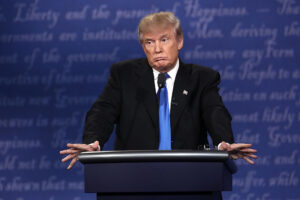
(Photo by Win McNamee/Getty Images)
On January 2, 2021, Donald Trump called Georgia Secretary of State Brad Raffensperger and leaned on him to “find, 11,780 votes, which is one more than we have, because we won the state.” The next day, after Trump tweeted that Raffensperger was “unwilling or unable to answer questions” and that he “has no clue” about the fraud Trump believed went on, Raffensperger released a recording of the call to the media. And if you had to point to any one thing which led Fulton County District Attorney Fani Willis to impanel a special purpose grand jury to investigate the former president’s interference in the 2020 election, it’s that fateful call.
But that call was only one of many made by Trump and his allies, Rudy Giuliani, Mark Meadows, and Senator Lindsey Graham, as they sought to challenge Biden’s win, first by proving (nonexistent) fraud, and then by convincing the legislature to reconvene and steal the state’s 16 electoral votes for Trump. By January 2, Raffensperger had dodged 18 prior calls from the former president, who had already reached out to multiple state officials, including Governor Brian Kemp and Raffensperger’s chief investigator, who was then auditing the ballots in Cobb County.

3 Ways Lawyers Are Finding New Efficiencies With AI
Those who’ve adopted legal-specific systems are seeing big benefits.
And so it should not be surprising that the Raffensperger call wasn’t the only one recorded during this unprecedented pressure campaign. But yesterday, the Atlanta Journal-Constitution broke the news that DA Willis’s special purpose grand jury heard audio of a call wherein Trump pressured the late Georgia House Speaker David Ralston to convene a special session of the legislature to claw back Biden’s electoral votes.
AJC reporters Tamar Hellerman and Bill Rankin interviewed five of the 26 special purpose grand jurors tasked by DA Willis with investigating interference in the 2020 presidential election. Over six months, they heard from or about 75 witnesses, culminating in a report, portions of which were released in February. Aside from a few interviews with the garrulous jury foreperson, who described the recommended indictments as “not a short list,” there’s been radio silence for a month while prosecutors mull indictments which the DA described as “imminent.”
This new reporting reveals that Ralston, too, resisted Trump’s imprecations to corrupt the electoral process.
One juror said Ralston proved to be “an amazing politician.”
The speaker “basically cut the president off. He said, ‘I will do everything in my power that I think is appropriate.’ … He just basically took the wind out of the sails,” the juror said. “‘Well, thank you,’ you know, is all the president could say.”

Stand With Survivors: Legal Tools To Make A Real Difference This DVAM
Enhance your legal skills to advocate for survivors of intimate partner violence.
Multiple Republican politicians had already rebuffed Trump’s call to reconvene the legislature and recognize the fake Trump electors who had sworn themselves in and submitted a bogus certificate to the National Archives. Kemp protested publicly that, even if he did call the legislature into special session, it would be blatantly illegal to retroactively change the state’s election laws. This prompted Trump’s coup lawyer John Eastman to theorize that the US Constitution implicitly empowers state legislatures to convene themselves when it came to certifying federal elections. This new call proves that Trump got nowhere when he tried to convince legislators of this crackpot theory — although not from lack of trying.
And Ralston was no liberal squish. He famously opposed mailing absentee ballots to every Georgia voter during the coronavirus pandemic because “This will be extremely devastating to Republicans and conservatives in Georgia. Every registered voter is going to get one of these. … This will certainly drive up turnout.” But even he wasn’t buying what Trump and his pals were selling.
Other than the news of the Ralston call, the jurors were largely tight-lipped about the evidence they’d seen, as well as their prosecutorial recommendations. Unsurprisingly, they noted that the witnesses who’d fought subpoenas were significantly less cooperative and more inclined to take the Fifth than those who showed up willingly. And the panelists were deeply affected by testimony about the human toll this misinformation campaign took on people like Shay Moss and her mother Ruby Freeman, election workers falsely accused of counting “suitcases” of fraudulent ballots. One juror described crying in her car on the way home after listening to descriptions of harassment suffered by people targeted by Trump and his followers.
But in the main, the jurors described the importance of what they’d done, not just for any future prosecutions, but in terms of restoring faith in America’s elections and civic institutions.
“I can honestly give a damn of whoever goes to jail, you know, like personally,” one juror told the AJC. “I care more about there being more respect in the system for the work that people do to make sure elections are free and fair.”
“I tell my wife if every person in America knew every single word of information we knew, this country would not be divided as it is right now,” said another.
At the same time, they did appreciate that their report, and whatever indictments issue from the regular grand jury, are likely to have a huge impact.
“A lot’s gonna come out sooner or later,” one of the jurors said. “And it’s gonna be massive. It’s gonna be massive.”
Be there, will be wild … eventually.
EXCLUSIVE: Behind the scenes of Trump grand jury; jurors hear 3rd leaked Trump call [AJC]
Liz Dye lives in Baltimore where she writes about law and politics and appears on the Opening Arguments podcast.